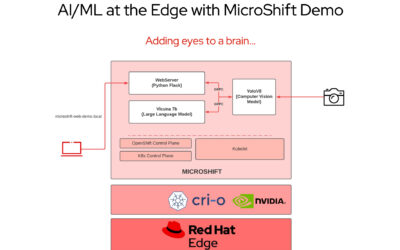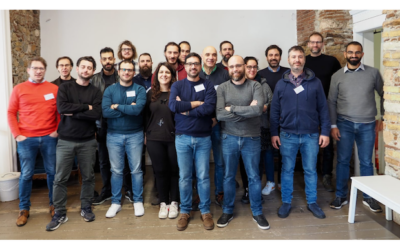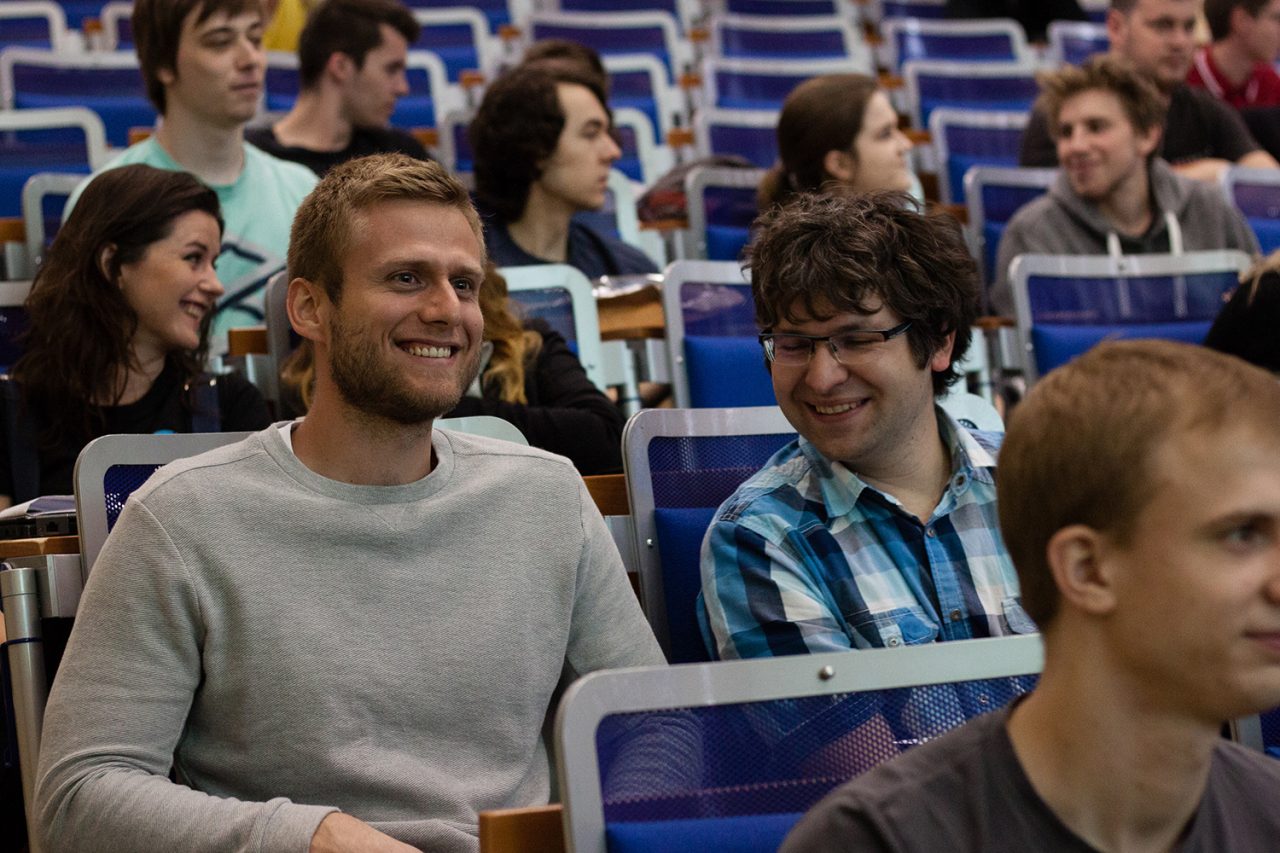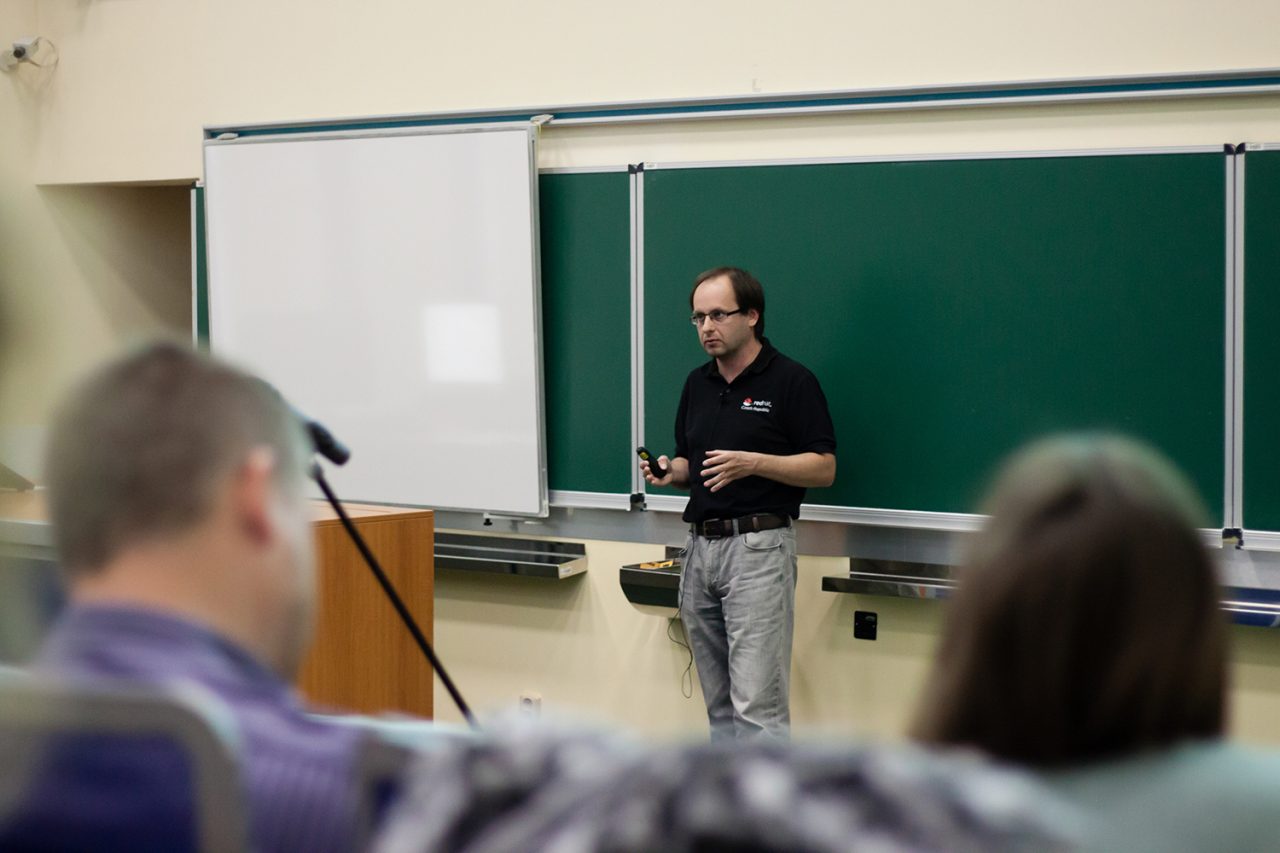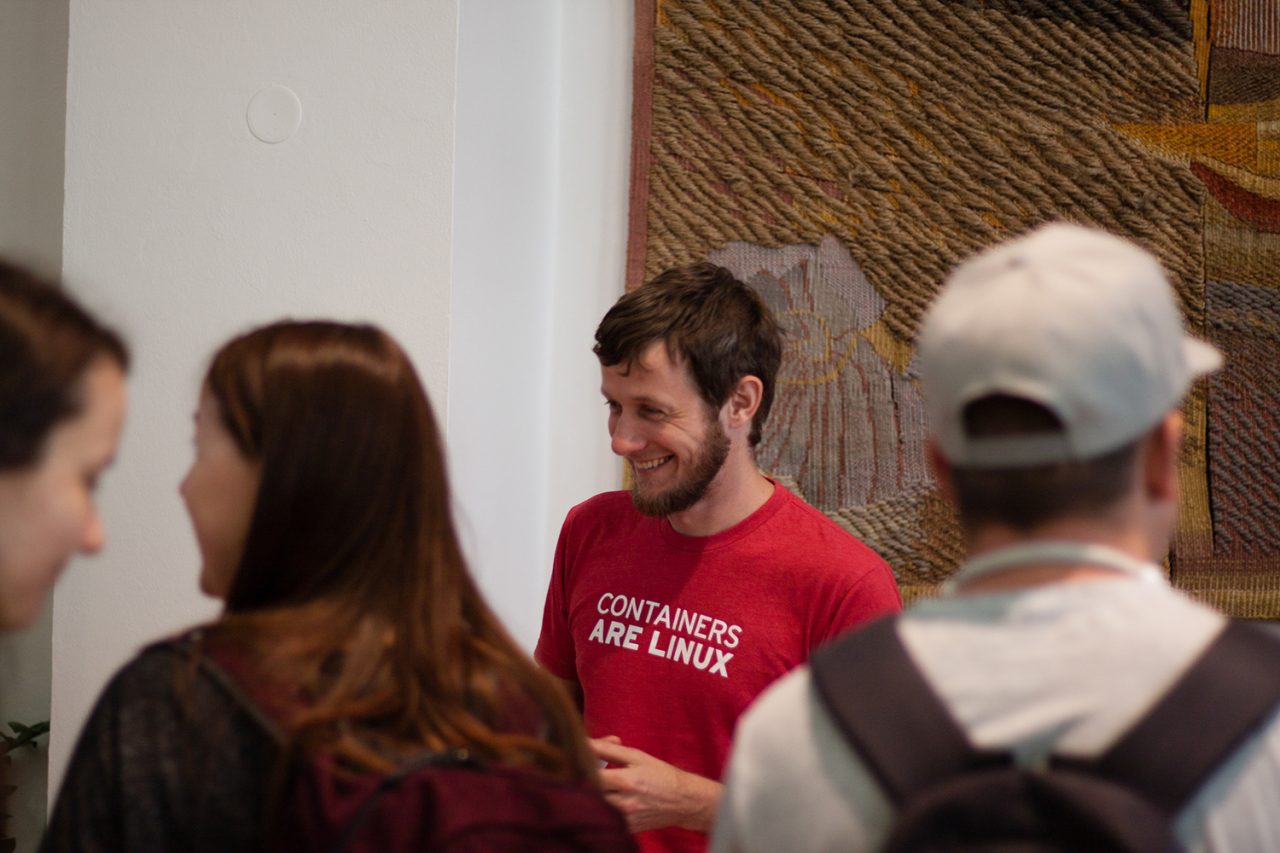Europe RIG
The Brno Red Hat engineering site collaborates with several universities not only in the Czech Republic and Slovakia but also in Europe. Our long-term partner universities are Masaryk University, Faculty of Informatics and Brno University of Technology, Faculty of Information Technology, but we also cooperate with several other universities, including Czech Technical University in Prague or Graz University of Technology, Austria.
Our engineers lead bachelor and master theses, we cooperate with university laboratories and researchers on projects and grants or sponsor Ph.D. students. We also deliver guest lectures, workshops or even whole courses at universities.
We also support high-school students and teachers, and also organize events for primary schools (for example, on teaching computer science to children).
Meetings are currently on pause; see details on prior meetings below.
Europe RIG Meeting [April 2023]
Checkpointing and Rollback-Recovery of Distributed Applications in Kubernetes
Research talk by Radostin Stoyanov, Oxford University
In recent years, containers have gained widespread adoption for developing cloud-native applications and microservices. These applications are typically composed of multiple containers managed by a container orchestration platform. However, the techniques currently offered by container orchestration platforms to replicate containers are insufficient to provide high-availability and strong consistency for distributed stateful applications. In this talk, we will explore how container checkpointing can be utilized to provide fault-tolerance for distributed applications, and discuss some of the benefits and challenges. This talk will also provide insights into how coordinated checkpointing can effectively enhance the reliability and resilience of stateful applications in Kubernetes clusters.
Radostin Stoyanov is a PhD student at the University of Oxford. His research focuses on improving the resilience and performance of HPC and cloud computing systems. Before joining Oxford, Radostin received his MPhil degree in Advanced Computer Science from University of Cambridge, and his MEng degree in Computing Science from University of Aberdeen. His master’s research explored virtualization in programmable network devices and secure image-less container migration.
Related research project: SnappyOS: Fault-Tolerant and Energy-Efficient Framework for HPC Applications
Europe Research Interest Group Meeting [February 2023]
Meeting Agenda:
Synergizing MLOPS, DataOps, Data Quality, and Software Engineering: A Research-Driven Approach to ML System Development, Deployment and Maintenance by Bestoun S. Ahmed Al-Beywanee, Karlstad University
This talk will provide a research-focused perspective on MLOPS, DataOps, Data Quality, and Software Engineering synergy. Attendees will gain insights into the latest developments and challenges in these fields from a research perspective and learn about the current state-of-the-art in these areas. The talk will explore how these fields can be integrated to improve the development, deployment, and maintenance of machine learning systems in industry and academia. The talk will highlight the importance of collaboration between data scientists and software engineers and how to establish an MLOPS pipeline from the software engineering and quality assurance perspective. The talk will interest researchers, data scientists, engineers, and anyone interested in learning about the latest research and advancements in these areas and how they can be applied to improve their workflows and outcomes. Several case studies and solutions will be presented from industry-academia collaborations projects.
Bestoun S. Ahmed, Ph.D., is an associate professor at Karlstad University and an excellent researcher at the Czech Technical University in Prague. He spent several years researching abroad in many international institutes and collaborating with many industrial partners. He has a strong background in software engineering, artificial intelligence, machine learning, and AI Engineering. He has published several papers in leading journals and conferences in his field and has significantly contributed to developing new algorithms and techniques for solving complex problems. His current research focuses on software engineering for AI solutions and quality assurance in data-driven systems. He is also interested in applying MLOPs on the industrial scale and ensuring high data quality using software engineering concepts.
Europe RIG Meetings Archive
April 2023
February 2023
January 2023
December 2022
November 2022
October 2022
September 2022
June 2022
May 2022
April 2022
February 2022
September 2021
News
Edge and cloud computing conference spotlights CODECO decentralized edge-cloud orchestration
Red Hat Principal Software Engineer Ricardo Noriega de Sota presented an overview of the edge computing landscape and a demo highlighting the potential of AI at the edge during a keynote presentation at the January 18, 2024, CODECO Industrial Workshop. The talk...
Research launched to optimize an open source software ecosystem for EU processors
Red Hat Research has joined industry and university partners as a contributor to the Accelerated EuRopean clOud (AERO), a collaborative software development project that complements the European Processor Initiative (EPI), one of several European Commission (EC)...
People
Affiliated Universities
Faculty of Information Technology – Brno University of Technology
Faculty of Informatics – Masaryk University
Charles University
Czech Technical University in Prague
Graz University of Technology
University of Žilina
Events
Related Projects
Title Summary Research Area Universities hf:tax:research_area SEMLA: Securing Enterprises via Machine-Learning-based Automation The SEMLA project seeks to make the development of software systems more resilient, secure, and cost-effective. SEMLA leverages recent advancements … AI-ML KTH Royal Institute of Technology ai-ml DRIVE (Data-driven latency-sensitive mobile services for a digitalised society) The overall goal of DRIVE is to conduct world-leading research and education within the field of data-driven latency-sensitive mobile services … Cloud-DS, Hardware and the OS Karlstad University cloud-ds hardware-and-the-os QUBIP – Quantum-oriented Update to Browsers and Infrastructures for the PQ Transition The exciting frontiers opened by the development of quantum computers (QC) come at the cost of breaking the foundations of … Security, Privacy, Cryptography security-privacy-cryptography AIDA – A holistic AI-Driven networking and processing framework for Industrial IoT AIDA aims to enable novel trustworthy data-driven real-time industrial IoT applications by building a holistic AI-driven Networking and Processing framework. Indeed, … AI-ML, Cloud-DS, Hardware and the OS, Testing and Ops Karlstad University ai-ml cloud-ds hardware-and-the-os testing-and-ops AERO: Accelerated EuRopean clOud Several European flagship projects have emerged towards European sovereignty in chip design and computing infrastructure. Among them, the EU Processor … Hardware and the OS National Technical University of Athens, University of Geneva, University of Manchester, University of Pisa hardware-and-the-os CODECO: Cognitive Decentralised Edge Cloud Orchestration The overall aim of CODECO is to contribute to a smoother and more flexible support of services across the Edge-Cloud … Cloud-DS cloud-ds CHESS: Cyber-security Excellence Hub in Estonia and South Moravia The Cyber-security Excellence Hub in Estonia and South Moravia (CHESS) brings together leading R&I institutions in both regions to build … Security, Privacy, Cryptography Brno University of Technology, Masaryk University security-privacy-cryptography P2CODE (formerly INCODE): Programming Platform for Intelligent Collaborative Deployments over Heterogeneous Edge-IoT Environments The emergence of cloud-computing, coupled with the shift of processing intelligence towards the very network edge has lowered the bar … Cloud-DS Panepistimio Patron, Politecnico di Milano, University of Manchester, University of the West of Scotland cloud-ds Security and safety of Linux systems in a BPF-powered hybrid user space/kernel world With the introduction of BPF into the Linux kernel, we are seeing a sea change in the traditional application model. With BPF it is now possible to execute parts of the application logic in kernel space, leading to a novel hybrid userspace/kernel model. This is an exciting development that brings with it many opportunities, but also some challenges especially in the area of security. We have recently seen an example of this around the “kernel lockdown” functionality in the kernel, which would disable BPF entirely in its “confidentiality” mode. Hardware and the OS, Security, Privacy, Cryptography Karlstad University hardware-and-the-os security-privacy-cryptography ICOS: IoT2Cloud Operating System The ICOS project aims at covering the set of challenges coming up when addressing this continuum paradigm, proposing an approach embedding a well-defined set of functionalities, ending up in the definition of an IoT2cloud Operating System (ICOS). AI-ML, Cloud-DS, Security, Privacy, Cryptography National and Kapodistrian University of Athens, Technische Universitãt Braunschweig, Universitat Politécnica de Catalunya (UPC) ai-ml cloud-ds security-privacy-cryptography StrIoT: functional stream processing StrIoT is a functional stream-processing system written in the Haskell programming language. The StrIoT library provides a set of stream-processing … Cloud-DS Newcastle University cloud-ds SnappyOS: Fault-Tolerant and Energy-Efficient Framework for HPC Applications This project aims to design, implement and evaluate a system to enhance the security and privacy of emerging satellite communications infrastructure using in-network computing and software-defined networking. Security, Privacy, Cryptography University of Oxford security-privacy-cryptography Characterizing and optimizing reactive systems, a continuum language-runtime This research project was kicked off by a paper we published in REBLS 2021. This paper aimed at comparing the costs and benefits of three different reactive streams libraries for Java: do mature and complex libraries implementing involved optimizations perform better than newer libraries sacrificing such optimizations for a simpler codebase? Cloud-DS, Testing and Ops National Institute for Applied Sciences of Lyon (INSA Lyon) cloud-ds testing-and-ops PHYSICS: oPtimized HYbrid Space-time servIce Continuum in faaS Join Red Hat Research for the next Research Days event, “PHYSICS EU Project: Advancing FaaS applications in the cloud continuum,” on November 16, 2022, … AI-ML, Cloud-DS ai-ml cloud-ds Side-channel attacks on embedded devices and smartcards This project focuses on several aspects of side-channel attacks on embedded devices and smartcards, utilizing timing, power-analysis and other side-channels. … Security, Privacy, Cryptography Masaryk University security-privacy-cryptography Sec-certs: Mining issued Common Criteria and FIPS140-2 certificates The security certification reports might be long but is also a trove of publicly available data about otherwise proprietary devices … Security, Privacy, Cryptography Masaryk University security-privacy-cryptography Verifying constant-time cryptographic algorithm implementations The aim of this project is to verify the timing side-channel resistance of cryptographic implementations. The project focuses on the constant time (and constant memory access) generic cryptographic implementations of selected cryptographic algorithms. T Security, Privacy, Cryptography Masaryk University security-privacy-cryptography Trusted Computing Ecosystem The project aims to study the TPM ecosystem as currently exists in deployed devices and software applications using it, establish the types of chips and their properties one can encounter, investigate the state of patching of known vulnerabilities like ROCA against Infineon’s TPM (CVE-2017-15361) or TPMFail against Intel’s fTPM (CVE-2019-11090) and STM’s TPM (CVE-2019-16863) and analyze a reliability of stored integrity measurements (PCRs) for remote attestation and disk encryption uses. Security, Privacy, Cryptography Masaryk University security-privacy-cryptography Accelerating Microarchitectural Security Research We are working on processes and tooling to lower the barrier to entry into the field and accelerate attack research and mitigation across academia and industry. Security, Privacy, Cryptography Graz University of Technology security-privacy-cryptography Authentication in public open-source repositories This project focuses on user authentication in public repositories containing open-source projects, which are then used by commercial companies (e.g. Red Hat) as a source for their internally maintained repositories. Security, Privacy, Cryptography Masaryk University security-privacy-cryptography Adaptive Learning of Programming The mission of Adaptive Learning of Programming is to make learning more efficient and engaging by personalizing educational systems using artificial intelligence techniques. AI-ML Masaryk University ai-ml Perun: Lightweight Performance Version System Perun is an open source light-weight Performance Version System, which works as a wrapper over existing Version Control Systems and in parallel manages performance profiles corresponding to different versions of projects. Moreover, it offers a tool suite suitable for automation of the performance regression test runs, postprocessing of existing profiles or effective interpretation of the results. Brno University of Technology DiffKemp: Automatic analysis of semantic differences The project aims at creating a tool for automatic analysis of differences in the code between versions of the Linux kernel. The goal is to determine whether the semantics (the effect) of some kernel option, function, or parameter, changed between two kernel versions Brno University of Technology Vega Project The Vega Project team at Red Hat came up with an idea to harness the power of Kubernetes to provide the next-generation open-source tool for high-performance computing. The project is way past the design phase, and the team is already working on the proof-of-concept implementation using Red Hat OpenShift Container Platform. Masaryk University PatrIoT: Quality Assurance System for Internet of Things Technology The main goal is to design, implement and verify a framework for quality assurance of products based on the Internet of Things concept. The aim of the framework is to help individual IoT projects to establish an efficient testing and verification strategy of the infrastructure. The proposed framework is based on a model of the IoT infrastructure, composed of methodological part, driven by university team, and a technical part, mainly worked on by Red Hat engineers. Testing and Ops Czech Technical University testing-and-ops AUFOVER: The Automation of Formal Verification The goal of the Automation of Formal Verification (AUFOVER) project is to develop automated formal verification tools and integrate them for industrial use. The tools to be developed or improved within the projects are Verification Server, Verification Server Client Application, csmock plug-ins, DIVINE, Symbiotic and Testos. The purpose of the grant is to finish the development of university tools based on formal mathematical methods and their transfer to a commercial environment, including integration with industrial partners’ tools and incorporation of these tools into the commercial processes for software verification. Testing and Ops Brno University of Technology, Masaryk University testing-and-ops Usable Security for Developers This project focuses on the cryptographic APIs with respect to their developer usability. Such APIs are notoriously complex and prone to usage errors – our goal is to analyze their (in)correct usage and propose precautions and guidelines to achieve better usability and security. Security, Privacy, Cryptography Masaryk University security-privacy-cryptography Avocado Project The goal of the Avocado project, as a generic test automation framework, is to provide a solid foundation for software projects to build their testing needs on. With Avocado, common testing problems are solved at the framework level, and developers can spend more of their time writing tests that, by default, will adhere to best practices. Testing and Ops Czech Technical University, Karlstad University testing-and-ops
